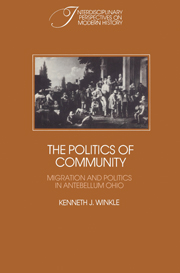Book contents
- Frontmatter
- Contents
- List of tables and figures
- Preface
- Introduction
- 1 The tide of emigration
- 2 An electorate in motion
- 3 From meeting to election: migration and suffrage
- 4 The defended community: migration and elections
- 5 “A movable column”: migration and voting
- 6 The core community: migration and leadership
- 7 Migration and local politics: an antebellum election
- Conclusion
- Notes
- Bibliography
- Index
7 - Migration and local politics: an antebellum election
Published online by Cambridge University Press: 06 October 2009
- Frontmatter
- Contents
- List of tables and figures
- Preface
- Introduction
- 1 The tide of emigration
- 2 An electorate in motion
- 3 From meeting to election: migration and suffrage
- 4 The defended community: migration and elections
- 5 “A movable column”: migration and voting
- 6 The core community: migration and leadership
- 7 Migration and local politics: an antebellum election
- Conclusion
- Notes
- Bibliography
- Index
Summary
On October 13, 1846, the voters of Wayne Senatorial District elected a state senator by just one vote, 2,441 to 2,440. The incumbent and loser, a Whig, immediately questioned the validity of the election returns. His apparent defeat gave the minority Democrats a tie in the Ohio Senate and thus a veto over changes in Ohio's banking policy, the issue that had divided parties and dominated the state's politics for a decade. Given the narrow margin of defeat and the stakes involved in the election, the contest was almost inevitable. The Whig challenge to the Democratic victory began, in fact, the moment the county clerk finished tabulating the official returns. Election challenges were frequent during this period, and the Whig organization was quite prepared to launch a contest. But the Whig candidate, Levi Cox, was initially reluctant to challenge the election returns. An impromptu Whig meeting coalesced at Howard's Tavern in the United States Hall in Wooster, the Wayne County seat, and throughout the night local Whigs wandered in off the city's streets to debate their course of action.
During the meeting, as many as 20 of Cox's supporters pressed him to contest the election. His supporters were mostly Whigs, but there was also a sprinkling of “soft” Democrats, who sided with Whigs on the banking issue and favored the legalization of banknotes or “soft” money.
- Type
- Chapter
- Information
- The Politics of CommunityMigration and Politics in Antebellum Ohio, pp. 132 - 170Publisher: Cambridge University PressPrint publication year: 1988



